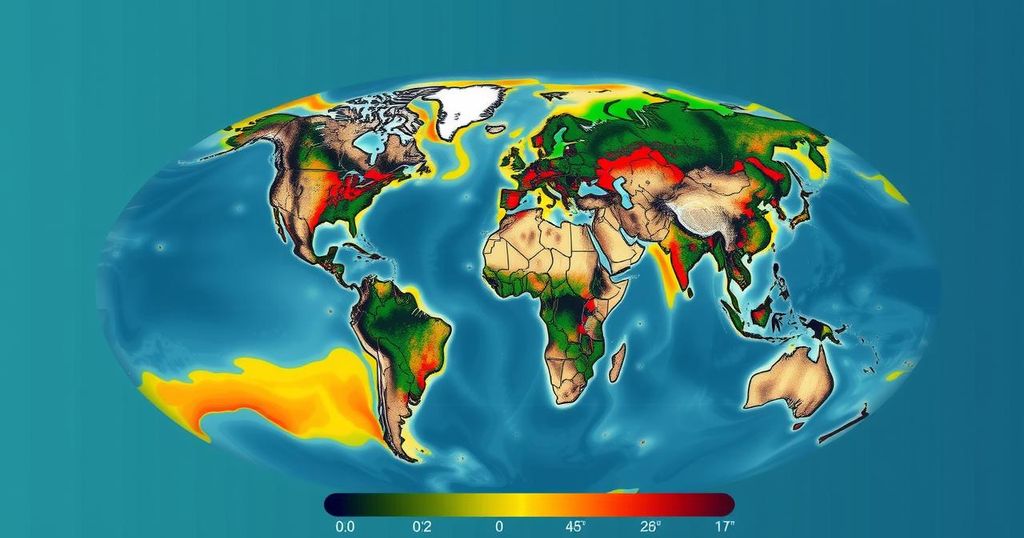The week of October 14-18, 2024, featured critical updates on climate change, including concerning statistics regarding ocean conservation, political issues surrounding disaster aid from former President Trump, an analysis revealing the connection between climate change and flooding in Nepal, Google’s venture into nuclear energy for data centers, emotional reactions from meteorologist John Morales regarding Hurricane Milton, and distress among youth about climate change. These developments collectively stress the urgent need for effective climate action.
In a weekly summary of vital climate developments from October 14-18, 2024, alarming insights on ocean conservation, political dynamics surrounding disaster aid, the factors influencing devastating floods in Nepal, advancements in nuclear energy for technology, emotional distress among youth regarding climate change, and the reflections of a meteorologist on recent hurricanes were addressed. 1. A recent report has revealed that, despite an ambitious target set at the United Nations Biodiversity Conference, only 2.8% of the world’s oceans are effectively protected. In 2022, countries adopted the Kunming-Montreal Global Biodiversity Framework, which stipulates that by 2030, 30% of terrestrial, inland water, and marine areas should be adequately conserved. However, current data indicates a significant shortfall, with merely 8% designated as Marine Protected Areas. 2. Reports indicate that former President Donald Trump initially opposed disaster aid requests from blue states, following the devastating wildfires in California in 2018. Two key events stand out: the hurricanes in Puerto Rico and Florida, where Trump’s decisions were heavily influenced by political affiliations and public support. 3. New scientific analysis has revealed that human-induced climate change significantly contributed to the recent heavy rainfall in Nepal, which resulted in catastrophic flooding and landslides, leading to 244 fatalities. The research pointed out that the intensity of the storm was 10% exacerbated by climate change, with rainfall exceeding historical records. 4. In an innovative move, Google has contracted for the construction of small modular nuclear reactors to address the escalating energy demands of its data centers. This marks a notable shift toward utilizing nuclear energy to achieve sustainability goals. 5. US meteorologist John Morales, known for advocating climate action, expressed his emotional distress on-air regarding Hurricane Milton’s alarming rapid intensification, highlighting the lack of significant action taken to combat climate change despite years of warnings. 6. A recent survey examining the opinions of young Americans on climate change unveiled that 85% are at least moderately worried about the issue, with significant percentages of respondents feeling that climate change adversely affects their mental health and daily lives. This concern transcends party lines, indicating a widespread urgency for climate action among the youth. Overall, the span of events highlights the pressing need for immediate and collective action regarding climate change and underscores the rising awareness and distress surrounding environmental issues among global citizens, particularly the youth.
This article synthesizes critical climate news and scientific findings that underscore the urgency of addressing climate change. Reports from global environmental organizations indicate a stark shortfall in ocean conservation efforts, emphasizing the significance of international agreements to reverse biodiversity loss. Additionally, the political ramifications of disaster aid demonstrate how climate impacts can intersect with governance and public opinion. Recent natural disasters, such as flooding in Nepal, highlight the dire consequences of climate change, while individual emotional responses to these changes further illuminate societal unease about environmental futures. Google’s engagement with nuclear energy introduces corporate responsibility into the climate conversation, suggesting a shift towards alternative energy solutions. Lastly, the sentiments of the youth reflect a growing demand for accountability and action against climate change.
In conclusion, the week of October 14-18, 2024, demonstrated substantial challenges and developments in the realm of climate change. The findings regarding ocean conservation reveal significant gaps in current protections, while political dynamics surrounding disaster response illustrate the interplay between governance and climate impact. The tragic events in Nepal underline the intensified effects of climate change, and the emotional responses of both experts and youth signal an urgent call for action. Google’s pioneering move into nuclear energy reflects a transition that may contribute to sustainable growth. Collectively, these developments underscore the necessity for immediate, coordinated efforts to combat climate change across all sectors of society.
Original Source: earth.org







